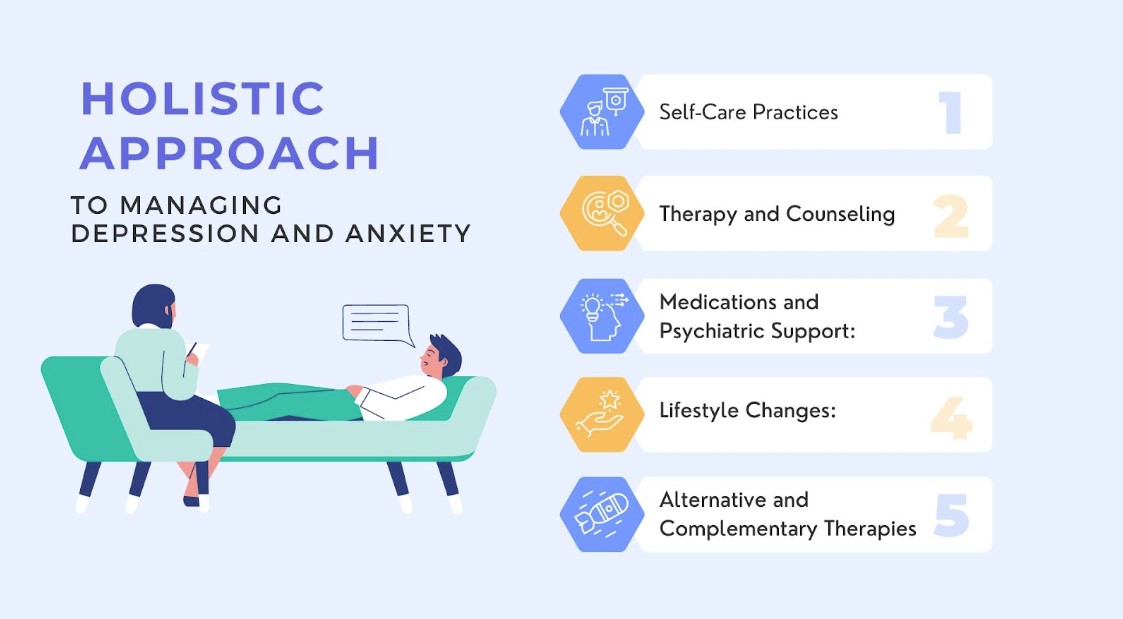Our own, our family’s, our friends’ mental health is crucial to the survival of us all. The last few years have taken a terrible toll on the mental health of adults and children, both.
Stacy J. Bryant, of SpringHive, has provided us with this detailed primer on protecting your mental health. If you or a loved one is having mental health difficulties, you might contact The Center, A Place of Hope, one of America’s top ten facilities for treating depression (www.aplaceofhope.com). Thank you, Stacy, for this post.
Depression and anxiety are mental health conditions that can significantly impact one’s well-being—understanding these conditions and how to manage them effectively and comprehensively is important. In this regard, I aim to provide valuable insights on how to manage depression and anxiety.
By examining the causes, symptoms, and treatment options, individuals can gain a deeper knowledge of these conditions and learn practical strategies to cope effectively in both personal and professional settings.
Understanding Depression and Anxiety
Depression and anxiety are two of the most common mental health disorders that affect millions of people worldwide. While these conditions share some similarities, they differ in their symptoms, causes, and treatment modalities. Understanding the nuances of depression and anxiety is crucial in recognizing and managing the associated symptoms promptly and effectively.
Definition and Symptoms of Depression
Depression is a mental health disorder characterized by persistent feelings of sadness, hopelessness, and a loss of interest in activities.
Common Types of Anxiety Disorders
Anxiety disorders encompass a range of conditions, such as:
- Generalized Anxiety Disorder (GAD)
- Social Anxiety Disorder (SAD)
- Panic Disorder
- Obsessive-Compulsive Disorder (OCD)
- Post-Traumatic Stress Disorder (PTSD)
Differentiating Between Depression and Anxiety
Depression is primarily associated with a persistent low mood and lack of pleasure, whereas anxiety involves excessive worry and fear.
Common Causes and Risk Factors
Causes and risk factors of depression and anxiety include:
- Genetic and biochemical imbalances
- Traumatic life events
- Chronic medical conditions
- Substance abuse
- Environmental factors.
Treatment Modalities for Depression and Anxiety
Treatment options may include psychotherapy, medications, self-care strategies, alternative and complementary therapies, and support networks.
Recognizing the Signs and Symptoms
Identifying the signs and symptoms of depression and anxiety is crucial for early intervention and effective management. Let’s explore the different indicators and the role of self-awareness in identifying these warning signs.
- Physical Symptoms of Depression and Anxiety
Exploration of physical manifestations commonly associated with depression and anxiety, such as changes in appetite and sleep patterns, fatigue, muscle tension, and general body aches.
- Emotional and Behavioral Indicators
In-depth examination of emotional and behavioral cues that may indicate the presence of depression and anxiety, including withdrawing from social activities, loss of interest, feelings of hopelessness, irritability, and difficulty concentrating.
- The Role of Self-Awareness in Identifying the Signs
Explanation of the significance of self-awareness in recognizing the signs and symptoms of depression and anxiety. Discussion on developing mindfulness techniques and strategies for monitoring one’s emotional and physical states.
- Seeking Professional Help and Diagnosis
Insights into the importance of seeking professional assistance for accurate diagnosis and appropriate treatment. Guidance on how to reach out to healthcare providers, the different types of professionals available (therapists, psychiatrists, etc.), and the potential treatment options for depression and anxiety.
Holistic Approaches to Managing Depression and Anxiety
Find out how to manage depression and anxiety holistically, taking a closer look at numerous options beyond traditional treatments.
- Self-Care Practices
Self-care is vital for maintaining good mental health. By prioritizing self-care, individuals can create a positive and supportive environment for themselves. Here are some key self-care practices to consider:
- Establish a healthy routine: Creating a structured daily routine can provide a sense of stability and purpose.
- Engage in physical activity and exercise: Regular exercise releases endorphins, improving mood and reducing stress.
- Prioritize sleep and rest: Getting enough quality sleep is crucial for the body and mind to recharge and rejuvenate.
- Nourish the body with a balanced diet: Eating nutritious meals supports overall well-being and positively impacts mood and energy levels.
- Reduce stress through relaxation techniques: Practicing deep breathing exercises, meditation, or other relaxation techniques can help alleviate stress and anxiety.
- Therapy and Counseling
Therapy and counseling are essential resources for managing depression and anxiety. They provide a safe, supportive space to address and work through emotional struggles. When considering therapy, it’s important to be aware of the following:
- Explore therapy options: There are various therapeutic approaches, such as cognitive-behavioral therapy (CBT), which focus on identifying and changing negative thinking patterns.
- Benefits of therapy: Therapy can help individuals develop coping skills, emotional regulation, and symptom management for depression and anxiety.
- Finding the right therapist: It’s crucial to find a suitable therapist or counselor who you feel comfortable with. This requires establishing a trusting and supportive therapeutic relationship.
- Importance of a supportive therapeutic relationship: A solid therapeutic relationship enhances the effectiveness of therapy by providing a safe, non-judgmental environment to explore and process emotions.
- Developing coping mechanisms: Therapy equips individuals with valuable tools to develop effective coping mechanisms, enabling them to navigate their emotions and challenges more skillfully.
- Medications and Psychiatric Support:
Effective treatment for depression and anxiety often requires a combination of medication and psychiatric support. These treatments can provide substantial benefits and are typically used in conjunction with other therapeutic strategies. It’s essential to keep in mind the following:
- Understanding Antidepressants and Anti-Anxiety Medications:
Antidepressants and anti-anxiety medications are prescribed to help stabilize brain chemistry and reduce the symptoms associated with depression and anxiety. These medications target neurotransmitters in the brain to regulate mood and anxiety.
- The Role of Psychiatric Support in Medication Management:
Psychiatric support involves collaborating closely with a psychiatrist or mental health practitioner who specializes in prescribing and managing medications. Through comprehensive assessments, the healthcare provider determines the most suitable medication and dosage for each individual’s needs.
- Benefits and Potential Side Effects of Medications:
Medications can offer substantial benefits, including alleviating symptoms, improving overall well-being, and enhancing daily functioning. However, it is essential to be aware of the potential side effects of medication use and promptly communicate any concerns to the healthcare provider.
- Importance of Ongoing Assessment and Monitoring:
Ongoing assessment and monitoring by the healthcare provider are vital to evaluate the effectiveness of the medication and make any necessary adjustments. Regular check-ins ensure that individuals receive optimal care, minimize side effects, and maximize medicine’s benefits.
- Lifestyle Changes:
Our lifestyle choices play a crucial role in our mental health and well-being. By making positive changes in our daily habits, we can significantly improve our mental health and reduce the risk of developing mental health issues. Here are a few key lifestyle changes that have been proven to benefit mental health:
- Mindfulness and Meditation Practices:
Engaging in mindfulness and meditation practices can help us reduce stress, anxiety, and depression, promoting a sense of calm and well-being. These practices allow us to become more aware of our thoughts and emotions, enhancing our ability to manage them effectively.
- Building a Strong Social Support System:
Cultivating meaningful relationships and building a strong social support network is vital for our mental health. Having people we can rely on during challenging times provides us with a sense of belonging, emotional support, and encouragement.
- Limiting Alcohol and Drug Use:
Excessive alcohol and drug use can have detrimental effects on our mental health, leading to addiction, depression, and anxiety. By limiting or avoiding the use of these substances, we can protect our mental well-being and reduce the risk of developing related mental health issues.
- Creating a Healthy Work-Life Balance:
Maintaining a healthy work-life balance is essential for our mental health and overall well-being. Setting boundaries, prioritizing self-care, and making time for activities we enjoy outside of work can help prevent burnout and reduce stress levels.
- Alternative and Complementary Therapies
Alongside traditional approaches, alternative and complementary therapies are becoming recognized as useful options for managing depression and anxiety. These therapies allow individuals to explore non-conventional methods that promote holistic well-being and improve mental health.
It is important to consider some key aspects when exploring alternative and complementary therapies:
- Exploring Alternative Therapies:
Alternative therapies like acupuncture, yoga, and meditation provide unique pathways for addressing mental health conditions. These practices emphasize the mind-body connection, fostering self-awareness and relaxation.
- Understanding Their Role in Managing Depression and Anxiety:
Alternative therapies can effectively reduce symptoms of depression and anxiety by promoting relaxation, stress reduction, and emotional balance. They serve as valuable tools that complement traditional treatments, contributing to overall mental well-being.
- Research Evidence Supporting Alternative Approaches:
Scientific research demonstrates the efficacy of alternative therapies in managing mental health conditions. For instance, acupuncture has been found to be effective in reducing anxiety and depression symptoms.
- Integrating Complementary Therapies with Traditional Methods:
The integration of complementary therapies with traditional treatments offers a comprehensive and personalized approach to mental health care. By combining the strengths of both conventional and alternative therapies, individuals can maximize the benefits for their well-being.
The Bottom Line
Remember, a comprehensive guide to managing depression and anxiety can provide in-depth information and resources for those seeking effective strategies for their mental health journey. By incorporating these strategies into our lives and seeking professional support when needed, we can take significant steps toward achieving and maintaining mental well-being
Author Bio
Stacy J. Bryant is a content writer and a mental health advocate. She believes that mental health is something everyone should be aware of, and she hopes to spread awareness through her writing. She has several years of experience as a content writer and has written for several websites. She is currently the top contributor for Hanei Health Solutions, a company that helps people with mental health problems. In addition, she also works for Springhive, particularly as a content creator for their Mental Health Care clients, to help them get ahead in their industry through SEO-friendly content. During her free time, she likes to read and write. And do activities to maintain her mental health.
https://www.haneihealthsolutions.com/understanding-depression/
Understanding the nuances of depression
Images: Sources from Canva










